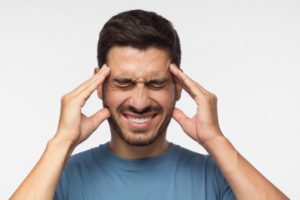
Grinding your teeth may seem like a harmless habit, but it can cause damage to your teeth as well as other symptoms.
What is Bruxism?
Bruxism is the condition of grinding or clenching your teeth when you’re not eating. It frequently occurs at night, but you can also clench or grind your teeth during the day.
How Do I Know if I Have Bruxism?
If you grind or clench your teeth in your sleep, you may not be aware of it until your sleep partner notices or until you have a symptom that makes you or your dentist suspect bruxism. The following symptoms are some to look out for:
- Teeth that are worn, flattened, fractured, chipped, or loose
- Tooth Pain
- Jaw, neck, or face pain
- Headache starting in your temples
- Tired or tight jaw muscles
- Disrupted Sleep
Is Bruxism a Sign of Sleep Apnea?
They’re not always linked in every case, but sleep apnea can cause bruxism.
Can Bruxism Be Reversed?
Bruxism can be treated in the following ways:
- A custom-made mouth guard to wear when your sleep
- Stress Reduction
- Treatment for a sleep disorder like sleep apnea
What Stops Teeth Grinding When Sleeping?
Your dentist can make a mold of your teeth and send it to a lab that will create a custom mouth guard. You’ll wear this at night, and it will be fitted for your top or bottom row of teeth. A custom-made guard will help protect your teeth by keeping them separated.
Does Improper Teeth Alignment Cause Bruxism?
Improper teeth alignment can cause bruxism. If you grind your teeth because they’re not properly aligned, your dentist may recommend adjusting your bite or receiving orthodontic treatment to properly align them.
Do Muscle Relaxers Help Bruxism?
Taking a muscle relaxant before bedtime may help with bruxism, but they are often recommended only in the short term.
What Exercises Can Treat Bruxism?
Exercises can help you grind and clench your teeth less frequently. If you focus on your tongue and teeth, you can place your tongue on the back of your top teeth. In this position, you won’t be able to grind your teeth. You can also try clenching your jaw muscles deliberately and slowly relax them. A physical therapist can suggest further exercises.
What is Splint Therapy?
Similar to a mouth guard, a splint is made in a lab based on an impression of your mouth. It prevents grinding and clenching and thus helps ease muscle tension and stabilizes your jaw.
Are There Any Medications for Bruxism Treatment?
The following medications are sometimes used to treat bruxism:
Muscle Relaxants
Taken before bedtime for a short period of time.
Botox Injections
May help with severe bruxism that hasn’t responded well to other treatments.
Are There Any Home Remedies for Bruxism?
These home remedies can help alleviate bruxism:
- Reducing Caffeine
- Not Chewing Gum
- Holding a warm washcloth against your cheek at bedtime
- Taking a warm, relaxing bath before bedtime
If you grind your teeth, make an appointment today with Cedar Mountain Dental in Newington, CT. For over 30 years, we’ve provided high-quality care to patients of all ages.

